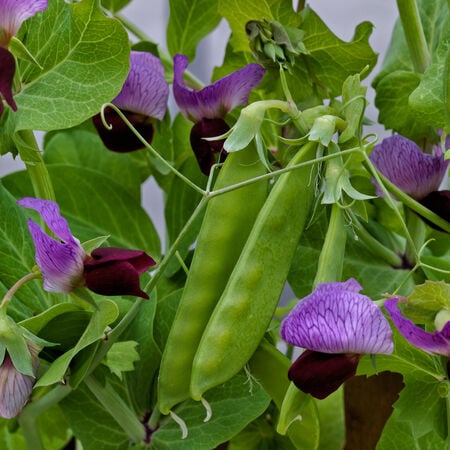Little SnowPea Purple, Pea Seeds
Key Attributes
Key Attributes
Product Details
Weight
.08Plant Height
24"Botanical Name
Pisum sativumSeed Type
SeedSeeds Per Gram
6Seeds Per Pound
2,630Row Spacing
12-18"Packet
160 SeedsSow Depth
1"Seeds Per Ounce
164Breed
Open-pollinatedSun
Full Sun / Partial ShadeMaturity
Early SeasonLife Cycle
AnnualSow Method
Direct SowPlant Spacing
1"Categories
PeaGermination
6,7,8,9,10Days To Maturity (# Days)
59Seeds Per Acre
275 lbsComponents
Growing Instructions
![]() Learning Download: How to Grow Peas
Learning Download: How to Grow Peas
Peas are a fun plant to grow with different varietals allowing gardeners to eat the whole pod or split the shell open to find bursting peas inside. Depending on the species, peas can be grown in a pot or in a garden, which makes the plant a good option for all green-thumbs.
Before Planting: Prior to sowing, add wood ashes to the area for fertilization. Soak seeds overnight before planting.
Planting: Plant the first sowing in early spring as soon as the soil can be worked. Sow 2″ apart, 1″ deep, with rows 12″-18″ apart. If pea is a vining variety its best to have a support or trellis system to help with diseases and yield. For fall crops sow 6-8 weeks before first frost date. Inoculate peas to encourage formation of nitrogen producing nodules on the plant roots. This enriches the soil, results in larger plants, and increases yield.
Watering: Always keep seeds well watered during germination and then water the plant sparingly. Don’t hoe the area as this may damage roots.
Fertilizer: Too much fertilization may harm peas, as they are vulnerable to nitrogen. Compost may help, though pea plants don’t need much fertilizer.
Days to Maturity: Peas can typically be harvested between 12 and 15 weeks after planting. Rotate pea crop every other year. (See each variety for days to maturity)
Harvesting: Harvest snow peas right at the beginning of seed formation and sugar peas when seeds are full size. Harvest frequently to increase yields. Do not let peas over-mature as this will slow production.
Tips: Peas are a cool weather crop best grown in spring and fall. For best yields ensure adequate fertility, pH of 6.0-7.5 and well draining soil.
AVG. Seeding Rate: 1 lb./80′, 13 lb./1,000′, 272 lb./acre at 25 seeds/ft., in rows 24″ apart.
Shipping Schedule
Our Seed Promise
 "Agriculture and seeds" provide the basis upon which our lives depend. We must protect this foundation as a safe and genetically stable source for future generations. For the benefit of all farmers, gardeners and consumers who want an alternative, we pledge that we do not knowingly buy or sell genetically engineered seeds or plants.
"Agriculture and seeds" provide the basis upon which our lives depend. We must protect this foundation as a safe and genetically stable source for future generations. For the benefit of all farmers, gardeners and consumers who want an alternative, we pledge that we do not knowingly buy or sell genetically engineered seeds or plants.
The mechanical transfer of genetic material outside of natural reproductive methods and between genera, families or kingdoms, poses great biological risks as well as economic, political, and cultural threats. We feel that genetically engineered varieties have been insufficiently tested prior to public release. More research and testing is necessary to further assess the potential risks of genetically engineered seeds. Further, we wish to support agricultural progress that leads to healthier soils, to genetically diverse agricultural ecosystems, and ultimately to healthy people and communities.
To learn more about the "Safe Seed Pledge" please visit www.councilforresponsiblegenetics.org.

